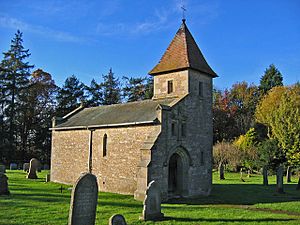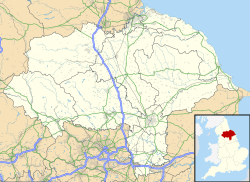Chapel of Rest, Brompton, Scarborough facts for kids
Quick facts for kids Chapel of Rest, Brompton Cemetery |
|
|---|---|
| Chapel of Rest, Brompton, Scarborough | |

An early work by Temple Moore
|
|
| 54°13′20″N 0°33′02″W / 54.2221°N 0.5506°W | |
| Location | Brompton, Scarborough, North Yorkshire |
| Country | England |
| Denomination | Church of England |
| History | |
| Founded | 1889 |
| Founder(s) | Sir George Cayley |
| Architecture | |
| Heritage designation | Grade II |
| Designated | 3 September 2019 |
| Architect(s) | Temple Moore |
| Administration | |
| Diocese | Diocese of York |
The Chapel of Rest is a special building located in Brompton Cemetery, near Scarborough in North Yorkshire, England. It was designed by a famous church architect named Temple Moore when he was just starting his career. This chapel is considered an important historical building, known as a Grade II listed building.
History of the Chapel
Around 1880, a new vicar, Reverend Francis Chambers, arrived at All Saints Church in Brompton. He wanted to make some important changes. One big change was closing the old churchyard. They needed a new place for burials, so a new cemetery was created.
Sir George Cayley, a wealthy local landowner who lived at Brompton Hall, paid for a new building. This building was a 'chapel of rest' for the new cemetery. A chapel of rest is a quiet place where families can say goodbye to loved ones before a burial.
Sir George Cayley chose a young architect named Temple Moore to design the chapel. Temple Moore was 33 years old at the time. He later became one of England's most important church architects. He designed about 40 new churches and helped fix many others.
Design and Features
The Chapel of Rest has a wide, triangular front part called a gable. This part faces the cemetery. It also has a bell tower that is not perfectly even, making it look a bit unique. The bell tower has a pointed, pyramid-shaped roof.
A famous architectural guide, Pevsner's Yorkshire: The North Riding, describes the chapel as "wonderfully lopsided." This means it looks charmingly uneven. The chapel was officially recognized as a Grade II listed building on September 3, 2019. This means it is a building of special historical or architectural interest.


